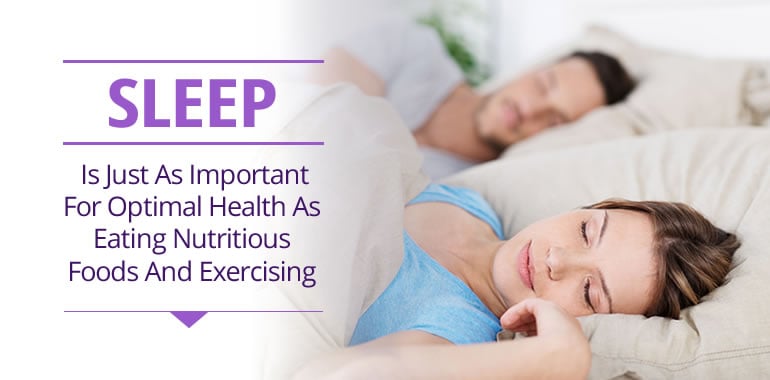
We all know that eating nutritious foods and exercising daily are important for good health, but did you know that SLEEP is just as important for optimal health? With our stressful lives—working longer and more hours per week, keeping up with our kids’ hectic schedules, taking care of aging parents, and our overuse and reliance upon electronic devices—not only are we getting LESS sleep than past generations but our sleep QUALITY has also declined significantly.
WHY IS SLEEP SO IMPORTANT ?
Sleep is important for BRAIN FUNCTION
Sleep is important for BRAIN FUNCTION including cognition, concentration, productivity, decision-making, and performance. While we sleep our brain restructures and organizes information and memories from our day which help to improve our memory and recall. Pulling an all-nighter before final exams or rehearsing your big presentation into the wee hours of the night may not be in your best interest when it comes time for you to perform the next morning.
We can all agree that lack of sleep causes drowsiness in adults but studies have found that in children it causes hyperactivity, inattentiveness, and impulsiveness—ask any parent who let their child stay up way past bedtime in hopes they would sleep in the next day. We’ve all been there. Chances are that not only did said child NOT sleep in the next morning, he likely woke even earlier and was sporting his super cranky pants ALL. DAY. LONG! Sleep is even more important for children because their little brains are growing, making neural connections, and consolidating memories that will affect how they learn and communicate during their waking hours.
Poor sleep linked to increased risk of heart disease
Poor sleep has been linked to increased risk of heart disease, stroke, Type II diabetes, and obesity. Sleep loss is known to activate undesirable markers of inflammation which can cause cell death. People with inflammation of the digestive tract specifically conditions such as irritable bowel syndrome (IBS) and Crohn’s disease were twice as likely to have relapse when they were sleep deprived. Sleeping less that 7-8 hours per night has been linked with increased risk of heart disease and stroke. Sleep restriction also affects blood sugar and glucose metabolism as well as reduces insulin sensitivity which increases the risk of developing Type II Diabetes.
Good sleep habits help to strengthen our immune function
Good sleep habits help to strengthen our immune function and fight off the common cold. One 2-week long study monitored subjects after exposure a cold virus and found that those who slept less than 7 hours per night were THREE TIMES more likely to develop a cold than those who slept 8 hours or more.
Sleep affects our emotions
Sleep affects our emotions, social interactions, and response to pain. Researchers believe that poor sleep interferes with our ability to recognize important social cues and interpret emotional information. Mental health experts report that nearly 90% of patients with depression cite poor sleep quality. Unhealthy sleep behaviors have also been associated with increased risk of death by suicide. There is also a strong link between sleep loss and lower pain threshold.
Good quality sleep, in terms of duration, has been shown to enhance athletic and physical performance.
Conversely, in a study of over 2,800 women, researchers found that those who slept poorly had slower walking times, lower grip strength, and greater difficulty performing activities independently.
Good sleep habits can help you maintain a healthy weight.
Sleep and metabolism are controlled by the same sectors of the brain. When you are not getting enough sleep, hormones that regulate appetite also fluctuate. People who slept less were found to have higher levels of gherlin, the hormone that stimulates appetite, and were more likely to crave high fat/high caloric foods. Leptin, the hormone that acts to suppress appetite and help you feel full, decreases with loss of sleep making it difficult to interpret your body’s signals of being satiated. Not only this, but lack of sleep can decrease your motivation to exercise and cook more healthful meals. Bottom line is people who get adequate sleep tend to eat fewer calories and consume more healthful foods overall.
Lack of sleep can increase your risk of injury and accident
Finally, lack of sleep can increase your risk of injury and accident. Sleep loss slows your reaction time and impairs decision-making and problem-solving skills.
HOW MUCH SLEEP DO YOU NEED???
Most adults need 7-9 hours of restful sleep per night. If you wake up alert and refreshed—CONGRATULATIONS—you are a super sleeper!! However, if you chronically wake up still sleepy, irritable, and unable to focus throughout the day, you may want to check out some of the Super Sleeper Habits below to help improve your sleep and overall quality of life.



